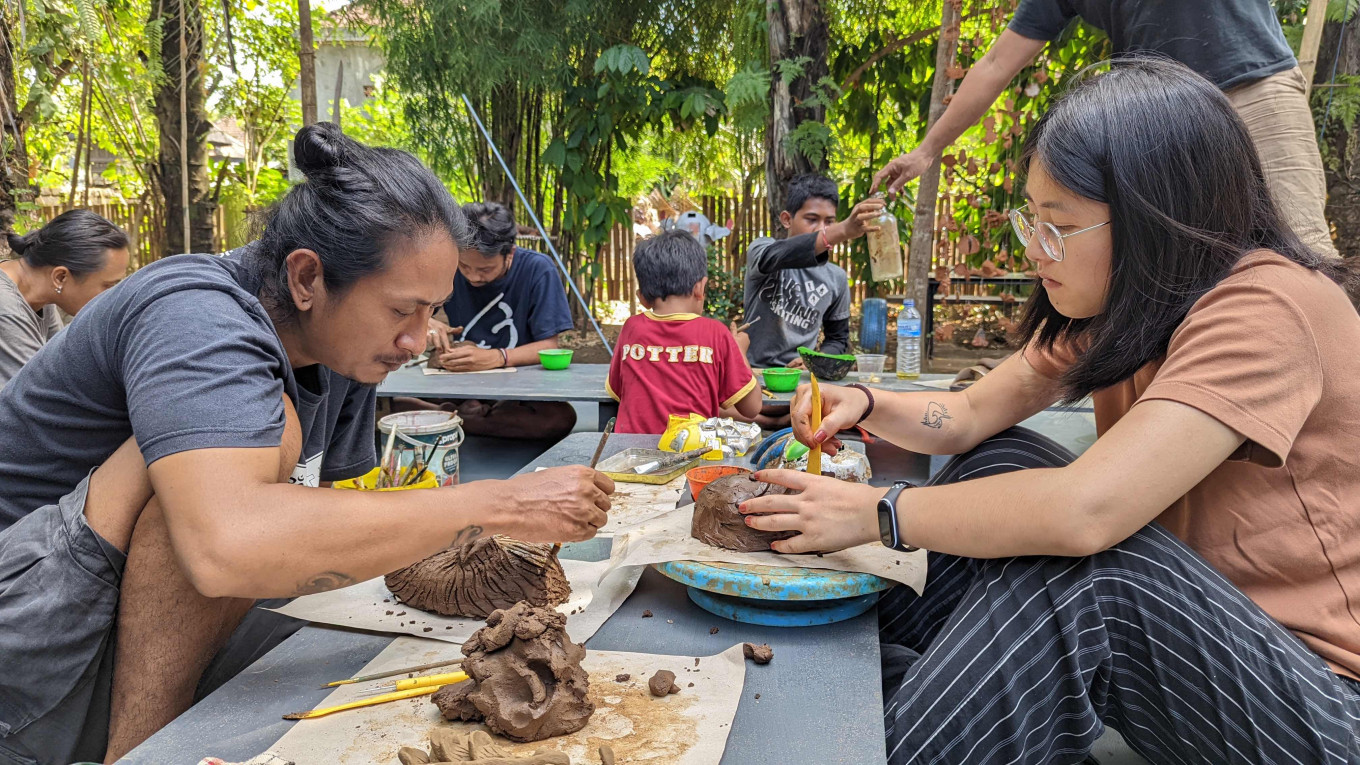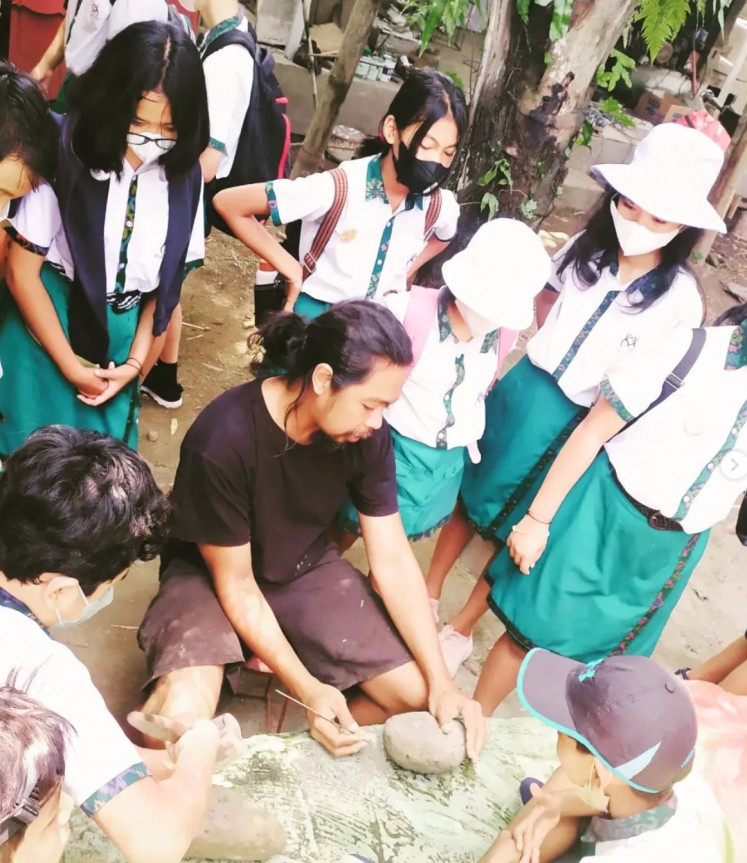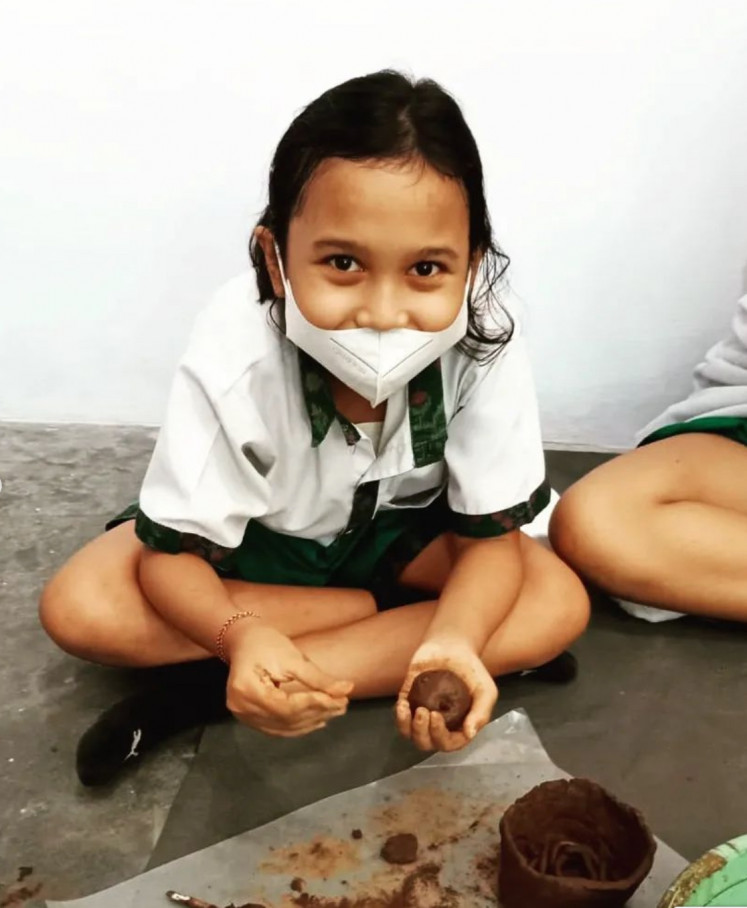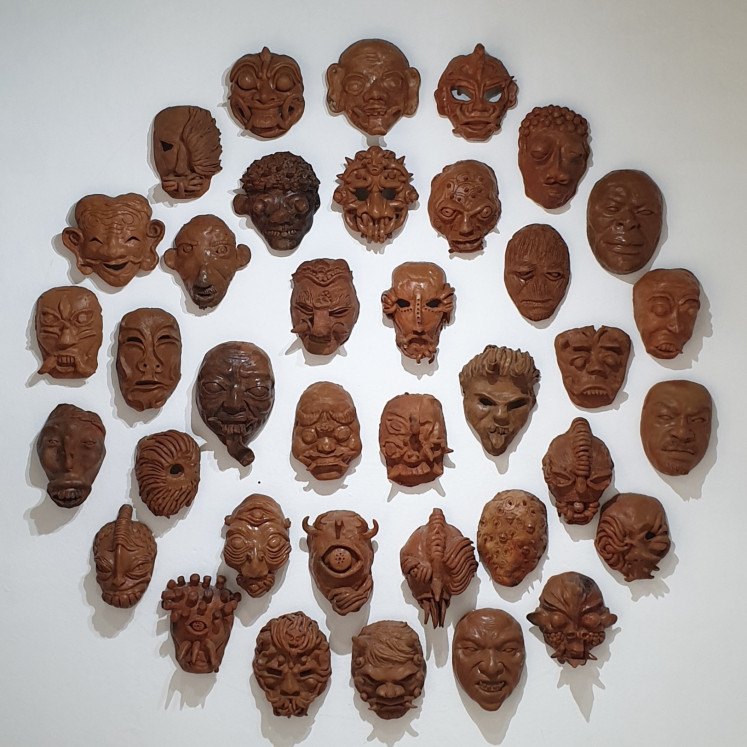Popular Reads
Top Results
Can't find what you're looking for?
View all search resultsPopular Reads
Top Results
Can't find what you're looking for?
View all search resultsKelompok Seni Gotong Royong reevaluates Balinese art collectives
During a crisis, human ingenuity comes to the fore. Kelompok Seni Gotong Royong, a new Balinese art collective adopting cultural philosophies began in 2020 in response to the global economic downturn resulting from the pandemic. Its initial objective was to feed the families of the group’s members. This vision has evolved into community art and cultural education and sharing with those in need.
Change text size
Gift Premium Articles
to Anyone
D
uring a crisis, human ingenuity comes to the fore. Kelompok Seni Gotong Royong, a new Balinese art collective adopting cultural philosophies began in 2020 in response to the global economic downturn resulting from the pandemic. Its initial objective was to feed the families of the group’s members. This vision has evolved into community art and cultural education and sharing with those in need.
“A few months into the pandemic, the local economy began spiralling downward with the closure of international tourism. As a result, there were real concerns among my artist friends,” Kelompok Seni Gotong Royong (KSGR) cofounder Rio Saren told The Jakarta Post. “These anxieties were the catalyst to forming KSGR.
“A radical shift in mindset was required to combat an uncertain future and the challenges of generating a sustainable income. We had to scrutinize the understanding of our potential and how we may thrive into the future.”
“Balinese art once functioned purely to serve the community. However, the movement away from the sacred with the development of the commercial art world over the last century led to art becoming political and exclusive. As a result, many were marginalized, with only a limited number of artists attaining success,” said Saren, who graduated from the Indonesian Art Institute (ISI) Denpasar in 2008.
“We readdressed our art practices focusing on what was lost from our culture due to modernity.”
Established in May 2020, KSGR’s objectives are to realize new forms of value creation inspired by the wisdom of its heritage, with sustainability and cultural regeneration as essential priorities. The collective name, Gotong Royong (mutual cooperation), is derived from the village fundamental of communal sharing. The administrative system of the banjar (customary village council in Bali) is the collective’s defining model.
Sharing knowledge: Rio Saren, cofounder of Kelompok Seni Gotong Royong, shares his skills to some students of Bali Hati School. (Courtesy of KSGR) (Courtesy of KSGR/Courtesy of KSGR)KSGR’s Sunday gatherings at Pintu Saren Art Space, at the rear of Saren’s family compound in Sibangkaja, Badung, are a supportive environment for the members to discuss ideas related to the group and their studio practice. In addition, the preparation and partaking of food is a celebration and form of gratitude for their blessings. The Garam Dapur Project (Salt Kitchen) is an outcome of these discussions.
"An open space for preparing food and sharing ideas, Garam Dapur's emphasis is on learning, experimentation and presenting exhibitions," Saren explained. "We then set out to develop another idea, to generate a sustainable income by reviving traditional terracotta practices and creating functional, one-of-a-kind artisan products to sell. The abundant natural material is sourced locally at a minimal charge making it cost-effective. The firing process is done on-site in a Balinese kiln."
In 2021 KSGR began facilitating mid-week workshops to school groups for a minimal charge. Participating schools include Bali Hati School, Seva Karuna, Sekolah TK Kumara Dharmayasa, Sekolah Desa Negeri (SDN) 3 Sibang Kaja and the Green School Bali. The Green School group has been ongoing throughout 2022.
In February, by donation, workshops for local adults and children started. Each with a different theme. The participants included expatriates and tourists. The afternoon concludes with the sharing of traditional food. As a result, awareness of KSGR is spreading, and people travel from Denpasar and Mengwi to enjoy the unique experience.
Bright smile: A happy participant handles clay during a terracotta workshop held by Kelompok Seni Gotong Royong. (Courtesy of KSGR) (Courtesy of KSGR/Courtesy of KSGR)"KSGR's activities make a relevant cultural contribution. Especially when we see kids who want to play games on their cell phones, forget their digital distractions and concentrate on learning and being creative," said Saren's wife, artist and mother, Sumie.
“Making art traditionally using raw materials is relaxing and makes you feel down to earth again,” said 27-year-old Australian tourist Sue Xu Ding. “The by-donation system was a welcome surprise; I believe it is a proper art method. It allows participants to evaluate their experience and respond by paying what they feel is right.”
Saren is currently in discussions with the chairman of the committee of SDN 3 Sibang Kaja, Komang Suryawan, to develop a permanent sustainable program for all schools, especially for the early childhood age group, in Sibangkaja.
“I wish to capitalize upon every potential aspect and resource within my village to help develop a more prosperous community,” said Suryawan, who has a background in tourism and is the founder of the Edan Community, a social and environmental initiative.
“Education occurs not only in schools. Every environment is a space for learning. KSGR introduces new opportunities that can function side-by-side with the government curriculum,” said Suryawan, who lives nearby Saren.
“It is essential to foster the creativity of the younger generation. I hope that this program allows students to have the freedom to express their own ideas.”
Artwork: 'Topeng Pandemi' 2021-2022, an installation of terracota masks made by Kelompok Seni Gotong Royong and school children, is on display at Pintu Saren Art Space. (JP/Richard Horstman) (JP/Richard Horstman)Collectives have directed the development of Balinese art. Classical Balinese religious paintings were created within unique communities called sangging. From the 1920s, new commercial opportunities led to the formation of the first modern collectives and distinct ‘schools’ or village styles of art developed to capture the burgeoning tourist market. Contemporary art collectives began in the 1970s and continue to do so today. Their objectives, however, focus on discussing art ideas and how to capitalize upon the market. Proceeds of art sales go to the artist only.
Social media has effectively raised KSGR's and the artist's profiles, especially on Facebook, with the artists enjoying increased sales from the exposure. Both KSGR workshop models have proven popular, and the collective members receive a monthly allowance to pay for all their art materials in their personal practice. Sales of the KSGR member's art from Pintu Saren Art Space generate income for the collective. Transparency is paramount. Therefore, KSGR offers its monthly financial report to public scrutiny. KSGR's function has recently grown, donating money to a Sibangkaja resident in urgent need of medical attention.














